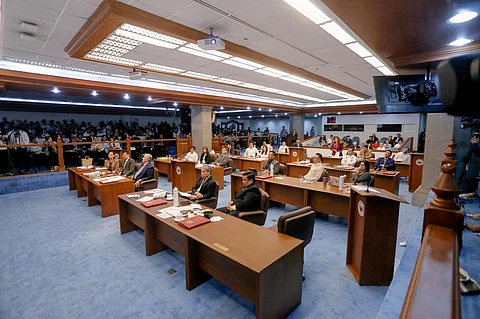
- NEWS
- the EDIT
- COMMENTARY
- BUSINESS
- LIFE
- SHOW
- ACTION
- GLOBAL GOALS
- SNAPS
- DYARYO TIRADA
- MORE

Various lawmakers in the Senate of the Philippines are requesting a live streamed budget deliberation to ensure transparency in scrutinizing the P6.79 Trillion national budget.
On Wednesday, Senate Minority Leader Vicente “Tito” Sotto III expressed full support for Concurrent Joint Resolution No. 4, filed by Senator Sherwin Gatchalian and backed by numerous sponsors, which seeks to strengthen transparency in the national budget process.
Sotto noted that the measure complements Senate Joint Resolution No. 1, which he earlier filed with five other senators to promote openness in bicameral conference committee proceedings.
“To afford the public transparency and access to the budget process, the Senate and House of Representatives will ensure that digital livestreaming is available and readily accessible to the public in all budget deliberations,” the lawmaker said, adding that this will ensure that all budget deliberations can be viewed in real time and revisited at any time by any Filipino, thereby fostering greater accountability.
While pushing for openness, the Minority Leader also stressed the need for caution in handling sensitive information.
He clarified to Senator Gatchalian that while the public may criticize and give feedback on deliberations and bicameral proceedings, these inputs should be thoroughly screened and subjected to a strict vetting process to protect the integrity of the process.
Full transparency
Meanwhile, Sotto’s fellow minority member, Senator Panfilo Lacson, backed the proposal of making budget deliberations public, stating that the most genuine transparency is full transparency.
He said this will make the proponents answerable for flood control and other infrastructure projects that turn out to be substandard or ghost projects.
He said Senate Concurrent Resolution No. 4, which was taken up in plenary on Tuesday, will not achieve its purpose of ensuring transparency in deliberations for the 2026 budget.
"To truly ensure transparency in the national budget process, the identities of individual proponents of amendments or insertions must also be made public, so they may be held accountable for substandard or ghost projects that they proposed in the crafting of the GAA. Otherwise, Senate Concurrent Resolution no. 4 will defeat its purpose," he said in a post on X Wednesday.
“If we don't have full transparency, I don't want to say we're just kidding each other, but we will not be fully transparent, and it will defeat the purpose of the resolution. We should identify the proponent because the hiding of 'pork' is there. If we don't trace amendments back to the proponents, this will allow questionable insertions all over again," the lawmaker added.
Lacson raised the issue after learning from Gatchalian that not all documents may be uploaded to the government's website under the concurrent resolution.
For her part, Senator Loren Legarda said public participation is needed for the deliberation of the 2026 national budget.
She said transparency must be matched with participation, the reason why she drew attention to the proposed People’s Participation in the National Budget Process Act filed by her and Senator Lacson.
“This measure institutionalizes the role of Civil Society Organizations (CSOs) in the preparation and authorization of the national budget. It guarantees at least 30 percent representation from marginalized sectors, ensures access to agency performance data, and allows CSOs to provide policy critiques. These safeguards will give communities—especially those most affected by government spending—an active voice in how public funds are planned and allocated,” according to Legarda. (RAFFY AYENG)
